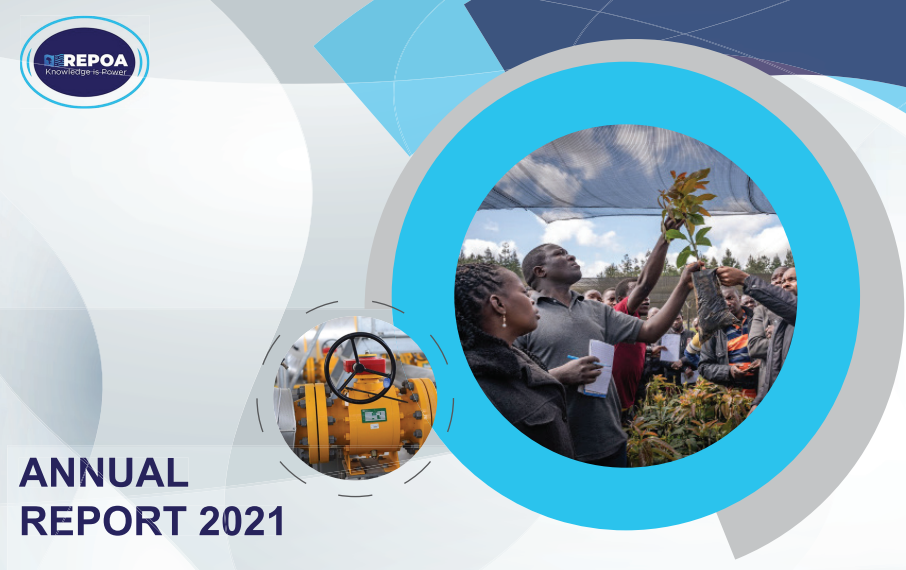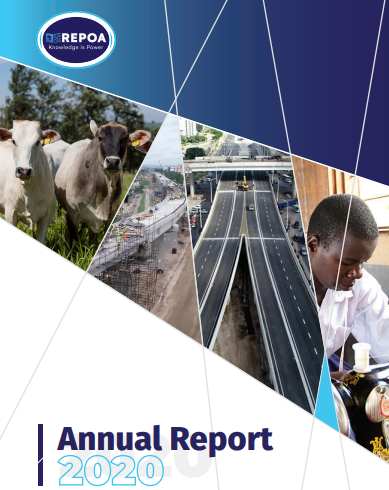Development Minerals in Tanzania: Accounting for missing women in the low-value minerals
This policy brief presents findings from primary research of the sub-sector in two districts of Coast region (Chalinze and Kisarawe) and two districts of Dar es Salaam region (Kigamboni and Kinondoni). Despite the immense supply of key inputs to industries and construction, little is known of development minerals sub-sector’s size and its contribution to the […]
The role of innovation and technology upgrading on industrial and export competitiveness in Tanzania
This policy brief presents a summary of key findings and recommendations from the REPOA study on the role of Innovation and Technology Upgrading (herein after, ITU) on competitiveness of Tanzania’s industrial and export sectors. To achieve its objective, the study was structured into three complementary components. The first component set the stage by conducting a […]
Tanzania’s Nationally Determined Contribution (NDC) – An Overview of Progress, Opportunities and Prospects
However, the Kyoto Protocol to the United Nations Framework Convention on Climate Change (UNFCCC) was adopted in 1997 and entered into force in 2005. It was the first attempt to commit industrialized countries (known as Annex 1 signatories) to limit and reduce greenhouse gases (GHG) emissions, while other signatories (non-Annex 1) consisting mostly of developing […]
Climate finance availability and access in Tanzania
Climate finance refers to the financial resources mobilized to fund actions that aim at mitigating the impacts of climate change, reducing vulnerability, and increasing the resilience of human and ecological systems to negative impacts of climate change. Climate finance remains central to achieving low-carbon, climate-resilient development. This policy brief specifically examines Climate Finance Flows and […]
Towards Socially Just Urbanization in Tanzania: Public Service Delivery
To better understand whether all urban dwellers can access public services equally, this policy brief examines the extent to which public services are available in Dar es Salaam and for whom. The analysis of public services covers agricultural extension services, education, guaranteed security of tenure, health care and medical services, housing, and provision of identity […]
Towards a Socially Just Urbanization in Tanzania: Political Participation and Social Cohesion
Tanzania’s rate of urbanization is estimated to be about 5%, and the urban population will grow to 35.5 million in 2030, and 76.5 million in 2050. Dar es Salaam, the biggest commercial city, will have a population of over 10 million people by 2030, thus will be, by definition, a mega-city. Urbanization is often taken […]
The Transformation of Cities in Tanzania: An overview
In a drive to better understand urbanization processes in Sub-Saharan Africa, Friedrich-Ebert-Stiftung (FES) supported research to address knowledge gaps, particularly related to the ‘just city’ pillars: dignity, rights and responsibilities, equity and diversity, and democracy – as well as opportunities for the ‘urban poor’ to influence urban policy. In Tanzania, the baseline survey was conducted […]
Formalisation of Street Vending in Dar es Salaam: Implementation and Enforcement of the Wamachinga Identity Card Initiative
Street vending in urban Tanzania is a big sector that touches different activities. This research paper applies the ‘forbearance’ conceptual understanding to investigate the introduction and implementation of small traders’ Identity Cards or simply Wamachinga IDs as an official formalisation strategy. It reports the findings of a qualitative research design undertaken to explain the process […]
REPOA’s Annual Report 2021

We are thrilled to present to our esteemed stakeholders our Annual Report for 2021. The year 2021 marked the second year of the implementation of our fifth strategic plan 2020–2024, seeking to inform and promote development policy agenda for further and accelerated socio-economic transformation and inclusive development.
Industrializing Agriculture in a Changing Climate: Effects of Weather Extremes on Rice Production in Tanzania
This is the third of a three-part series of policy briefs presenting findings of the main research report “Institutional and Operational Bottlenecks in Rice Value Chains and Export in Tanzania: The Case of Mbeya Rice Producers and Traders.” Through the EU-ACP TradeCom II Programme, the study is part of the “Targeted support to strengthen capacity […]
Transaction Costs in Tanzania’s Rice Trade within the EAC and with the EU
This is the second of a three-part series of policy briefs presenting findings of the main research report “Institutional and Operational Bottlenecks in Rice Value Chains and Export in Tanzania: The Case of Mbeya Rice Producers and Traders.” Through the EU-ACP TradeCom II Programme, the study is part of the “Targeted support to strengthen capacity […]
Post pandemic Outlook on Tanzanian Rice Trade: Opportunities and Pitfalls
This is the first of a three-part series of policy briefs presenting findings of the main research report “Institutional and Operational Bottlenecks in Rice Value Chains and Export in Tanzania: The Case of Mbeya Rice Producers and Traders.” Through the EU-ACP TradeCom II Programme, the study is part of the “Targeted support to strengthen capacity of policy makers, exporters, and trade associations to assess and review trade and related economic policies to promote trade competitiveness and diversification for widening trading opportunities with the EU’’ – project implemented by REPOA and ISS-Erasmus.
The EU-EAC Economic Partnership Agreement (EPA)—The EU Trade and Investment with Tanzania
This is the second of a five-part series of policy briefs presenting findings of a research study the “Implications of EU-EAC Economic Partnership Agreement (EPA) on Tanzania.” The study is part of a broader research and capacity building project “Targeted support to strengthen capacity of policy makers, exporters, and trade associations to assess and review trade and related economic policies to promote trade competitiveness and diversification for widening trading opportunities with the EU’’ implemented by REPOA and ISS-Erasmus – funded by the European Union (EU) through the EU-ACP TradeCom II Programme. Its contents are the sole responsibility of REPOA and do not necessarily reflect the views of the European Union, the EU-ACP TradeCom II Programme or ISS-Erasmus.
The EU-EAC Economic Partnership Agreement (EPA)—Background Assessment of the EAC-EU EPA
This is the first of a five-part series of policy briefs presenting findings of a research study the “Implications of EU-EAC Economic Partnership Agreement (EPA) on Tanzania.” The study is part of a broader research and capacity building project “Targeted support to strengthen capacity of policy makers, exporters, and trade associations to assess and review trade and related economic policies to promote trade competitiveness and diversification for widening trading opportunities with the EU’’ implemented by REPOA and ISS-Erasmus – funded by the European Union (EU) through the EU-ACP TradeCom II Programme. Its contents are the sole responsibility of REPOA and do not necessarily reflect the views of the European Union, the EU-ACP TradeCom II Programme or ISS-Erasmus.
INSTITUTIONAL ANALYSIS OF ENTERPRISE DEVELOPMENT CHALLENGES AND OPPORTUNITIES FOR TANZANIA
The overall objective of this research project is to identify institutional bottlenecks that limit competitiveness and enterprise development in the productive sectors– and the enabling policy framework to address them effectively. Specifically, the research project will seek to undertake three objectives, namely (i) Analysis of the institutional framework for enterprisedevelopment and competitiveness; (ii) Analysis of […]
REPOA Annual Report 2020

We are privileged to present to our esteemed stakeholders our annual report for 2020, the final year of the implementation of our fifth strategic plan, covering 2020–2024.